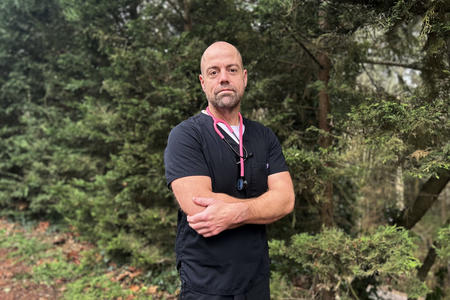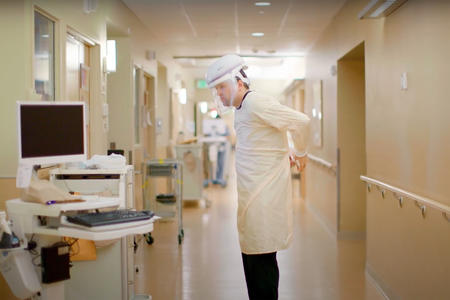Gjendem estimates those complaints piled atop more than 1,000 complaints already awaiting review by a Providence staffing committee.
Some nurses, he said, file a complaint every time the hospital falls out of compliance with its staffing plan – a matrix outlining the number and type of nurses for each unit based on the total number of patients and their needs.
Others don’t bother.
“They don’t believe in the process,” said Gjendem, who sits on the staffing committee at his hospital. “After being through the process. I don’t blame them. There genuinely was nothing in place for us to make any sort of legitimate change.”
Providence did not respond to multiple requests for comment.
A 2017 state law required hospitals to form staffing committees to establish safe staffing ratios for different levels of care and respond to related complaints. The law also gave the Department of Health limited authority to conduct an outside investigation when hospitals deviated from their plans, failed to submit annual updates or faced a documented pattern of staffing shortfalls.
In addition to the complaints awaiting review by local hospital committees, public records show at least 185 staffing complaints were submitted to DOH between 2020 and 2022. None of those complaints resulted in fines.
A nurse staffing bill in the 2023 legislative session would have set statewide patient-to-nurse ratios, but after pushback from the Washington State Hospital Association – which argued that rigid ratios could force hospitals to stop accepting patients – lawmakers passed a compromise bill that leaves many staffing decisions with local committees while expanding some state reporting and investigative oversight.
This story is part of Crosscut’s WA Workplace Watch, an investigative project covering worker safety and labor in Washington state.
Nurses and union representatives say local staffing committees have not provided timely review or meaningful enforcement. Nurses told Crosscut they are still taking on too many patients, and often missing or having to cut breaks short to care for patients amid post-pandemic staffing shortages. Around the state, nursing unions, who still want to see set ratios, are bringing the fight to contract negotiations.
“We tried the staffing committee thing,” said Cindy Franck, a registered nurse at St. Michael Medical Center in Silverdale. “What we didn’t realize is that it has no teeth.”
A 911 call from the Emergency Department
St. Michael made news headlines last fall – before the new law passed – when an emergency room nurse who felt the hospital was severely short-staffed and overwhelmed with patients called 911 to ask for reinforcements from EMS crews.
In the four months prior to that 911 call, half of the staffing complaints submitted to the DOH regarded St Michael.
In one complaint, a registered nurse alleged the emergency department was not adequately staffed for the number of patients it had received, and requested it be closed to new patients. At one point, four patients who arrived by ambulance waited in a hallway for over an hour, one of whom turned out to be COVID-19 positive, the nurse wrote in the complaint.
“This is an upper management hospital ‘culture’ problem,” the nurse wrote. “Days like this are putting the health and safety of not only our patients, but also my staff, of whom I am trying to protect, at increased and unnecessary risk.”
DOH closed the complaint 11 days later without an investigation “because based on the information provided, no violation of hospital law occurred,” according to reports obtained in a Crosscut public records request.
“St. Michael Medical Center, similarly to other health systems in the region and nation, has been grappling with a shortage of critical care professionals and high volumes of patients seeking emergency care,” said an official for Virginia Mason Franciscan Health, which runs St. Michael, in a statement to Crosscut.
Hospital officials stated they have since increased the number of registered nurses on staff and stationed a nurse at the emergency department registration desk “to more quickly assess and triage patients based on their acuity.”
A patient’s family member submitted another complaint regarding St. Michael, alleging that in late July they waited more than seven hours for a nurse to unclog her mother-in-law’s catheter.
“The doctor we saw told me that if I can stay and take care of her in the emergency room that I most definitely should,” the family member wrote. “That there is simply not enough staff to take care of the patients.”
DOH records from late April stated the complaint is still under investigation.
Media reports had also caught the eye of DOH, said Ramiro Cantu, director of the DOH health systems oversight office. DOH submitted its own complaint regarding the 911 call to its case management team to determine if an investigation was needed.
“We would expect the facilities to have a process by which they deal with surges in their patient population or the volume of patients coming into the ER,” Cantu said. “Calling the EMS was not one that we would normally see.”
The 2017 law restricted DOH’s investigative power to the following violations: failure to form a staffing committee, failure to submit an annual staffing plan, or a continuing pattern of a hospital failing to follow its plan.
Of the 185 complaints submitted to the DOH between 2020 and 2022, St. Michael Medical Center and Grays Harbor Community Hospital drew the most, with 31 and 32 respectively, according to data received in a records request. Virginia Mason Franciscan Health System, which runs St. Michael along with nine hospitals, was named in another 13.
“Much of the problem has been that there’s really limited enforceability,” said David Keepnews, executive director of the Washington State Nurses Association. “We know that many hospitals just aren’t following the staffing plans.”
“If there are no consequences to being out of compliance, there’s not a lot of incentive to being in compliance,” he added.
DOH also could not investigate during a national or state of emergency, according to the 2017 law, which for COVID-19 ran from February 2020 to October 2022 in Washington and until May 2023 nationally, close to half the time the law has been in effect.
Chelene Whiteaker, senior vice president of government affairs at the Washington State Hospital Association, said health care administrators recognize the long-term need to confront staffing concerns, but argued imposing rigid nurse-to-patient ratios could cut off critical care.
“What are we going to do when we don’t have enough staff? Do we turn people away?” Whiteaker asked. “Ratios didn’t address the fundamental underlying concern of how do you continue to deliver care to patients when you don’t have enough staff?”
Additional reporting imposed
Under the newly passed law, in addition to the staffing complaint process, hospitals will have to report to the state if they fall out of compliance with their staffing ratios 20% or more of the time. If that happens, hospitals must submit a “corrective action plan,” which could include reducing hospital beds or services or delaying the addition of new services.
Hospitals also must start reporting missed meals and rest breaks quarterly to the state, and, starting in July 2026, if 20% or more are missed, a fine will be issued which starts at $5,000 for smaller hospitals, according to the law. For the largest hospitals, that fine is $20,000.
Under the previous law, DOH could only investigate cases involving a pattern of staffing failures. The new law allows the state to investigate complaints submitted to hospital staffing committees that remain unresolved for more than 60 days.
The new law also incorporates new oversight from the state’s Department of Labor & Industries, which will work with DOH to outline by summer 2024 how the agencies will balance inspection and enforcement responsibilities. Sen. June Robinson, D-Everett, a main sponsor of the bill, said L&I has a long-established role in enforcing safe working conditions.
“It’s logical that both agencies would be involved,” Robinson said. “The Department of Health is not an agency that typically enforces. I don't want to say they don’t enforce, but it’s just a role that they don’t typically play.”
Keepnews said the new law lowers the bar for what the state can investigate, and puts some more muscle into enforcement.
“It was not our first choice,” he said. “We still see this as a step forward. Because it does so much to strengthen the structures and the processes that are there now and really expand them.”
As nurses at MultiCare Good Samaritan Hospital in Puyallup negotiate a new contract this spring, staffing ratios are still top of mind. ICU nurse Atalia Lapkin said staff at their sister hospital, MultiCare Tacoma General, was one of just a few hospitals in the state to win staffing ratio protections in their contracts.
“The bill is something that will take years to fully kick into place. So there’s no immediate safety for my patients,” Lapkin said. “We have seen people leave our hospital for Tacoma General, because they have great nurses, because they have ratios.”
Scott Thompson, a spokesperson for the MultiCare system, said the hospital has proposed adding meal-break and rest-break protections to be determined by the staffing committee as part of the contract.
“We hear the concerns they voice over staffing levels and burnout,” he said.
Lapkin, who sits on her union’s bargaining team, said the hospital has taken staffing ratios off the table. She argued there needs to be some minimum standards in place to protect workers and patients.
“Raises, they’re fine,” she said, “but money isn’t enough to get nurses to stay at the bedside.”
Get the latest investigative news
A newsletter for resources, data and behind-the-scenes insight into investigative efforts.






